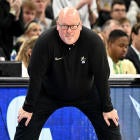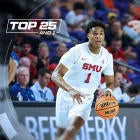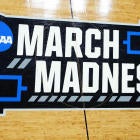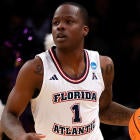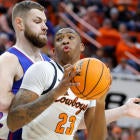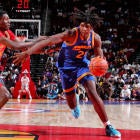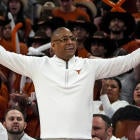
The 2022 Final Four schedule is set, and now it's time to do a deep dive on the scouting reports for all of the teams to better prepare you to make picks and predictions for the weekend action. The weekend is set up to be one of the most anticipated in college basketball history, with Kansas, Villanova, Duke and North Carolina representing the very best of the sport over the last two decades.
These are, after all, the programs that have combined for seven of the last 13 national championships and each is looking to make some history in New Orleans. A national championship win for Kansas or Villanova would propel each respective head coach, Bill Self or Jay Wright, to the front of the line when it comes to debate the best coach in the sport when we start next season. That debate, of course, will be on the table because the winningest coach in the history of Division I men's college basketball, Duke coach Mike Krzyzewski, is retiring after this Final Four.
Coach K's retirement tour reaching the Final Four is the greatest story anyone could ask for out of the 2021-22 season, but the icing on the cake is getting a national semifinal against Tobacco Road rival North Carolina after the Tar Heels handed the Blue Devils a loss in their final home game at the end of the regular season. First-year coach Hubert Davis is trying make some of his own history as well, having already done so with a Final Four appearance in his first year on the job.
Need more college basketball in your life? Listen below and subscribe to the Eye on College Basketball podcast where Gary Parrish and Matt Norlander provide a full preview and breakdown of the 2022 Final Four in New Orleans.
But what about the teams, the players, strengths, weaknesses and what to expect from all four teams when they hit the floor on Saturday night? We've got that, and more, covered for you below in our team-by-team breakdowns to get you ready for the semifinals of the NCAA Tournament where it will be No. 2 seed Villanova vs. No. 1 seed Kansas followed by No. 8 seed North Carolina vs. No. 2 seed Duke on Saturday in New Orleans
(1) Kansas Jayhawks
Midwest Regional Champion
- Record: 32-6
- Final Four appearances: 16 (1940, 1952, 1953, 1957, 1971, 1974, 1986, 1988, 1991, 1993, 2002, 2003, 2008, 2012, 2018, 2022)
- NCAA titles: 3 (1952, 1988, 2008)
- NCAA Tournament path: First round — Def. No. 16 Texas Southern 83-56; Second round — Def. No. 9 Creighton 79-72; Sweet 16 — Def. No. 4 Providence 66-61; Elite Eight — Def. No. 10 Miami 76-50
- Coach: Bill Self is making his fourth appearance in the Final Four as a coach, all of them coming with the Jayhawks. He won it all on his first visit in 2008, finished as a runner-up to Kentucky in 2012 and was eliminated from the national semifinals by eventual champion Villanova in 2018. With 16 Big 12 regular-season titles across his 19 years with the program, Self has established a model of regular-season consistency that is unmatched across the sport.
- Best player: Ochai Agbaji. The Big 12 Player of the Year does a little bit of everything for this team. He can step outside as one of the team's best three-point shooters or drive the lane to make a play at the rim. On defense he can be an effective on-ball defender, defensive rebounder or take off on the fast break to make a play in the open floor when Kansas wants to push the tempo.
- Strengths: This is an experienced team playing with a ton of confidence, trotting out four seniors, a junior and two sophomores in their seven-man rotation. Two of those seniors have the potential to be the best player on the floor, but we have yet to see them star at the same time. Agbaji was the Big 12's leading scorer, the Big 12 Player of the Year and an All-American, but the tournament has seen the emergence of transfer guard Remy Martin, who was named the Most Outstanding Player in the Midwest Regional despite coming off the bench as a sixth man and missing most of February with injury issues. Both players are not just capable scorers but key pieces in Kansas' perimeter defense, which will be an x-factor for success in the Final Four.
- Weaknesses: After a stellar showing in the Big 12 Tournament, the Jayhawks have been a little bit streaky in the Big Dance. The single-digit wins against both Creighton in the second round and Providence in the Sweet 16 had some tense moments, but it was allowing Miami to jump out to a 35-29 halftime lead that really brought those consistency concerns to the spotlight. Of course, this veteran Kansas team responded by outscoring the Hurricanes 47-15 over the final 20 minutes. But if you're looking for weaknesses in this experienced and well-rounded team, it's that we've yet to see a full 40 minutes of its best basketball in the tournament.
- Key number: 0. Every other team in the Final Four has at least one former five-star prospect on the roster, and the Jayhawks do not have any. Self and experts everywhere have frequently started analysis with some version of the phrase "this might not be Kansas' most talented team, but ..." before heaping praise on the 32-win Jayhawks. it's odd for a program that has signed numerous five-star prospects and produced dozens of NBA players to be one of the least talented teams in the Final Four, but the makeup of this squad -- which, for the record, does have 10 former four-star prospects -- might be just what they needed to get back to the Final Four and perhaps win another national championship.
- Outlook: The loss of the 2020 NCAA Tournament is not a primary motivation for Kansas, but it's not lost on anyone around the program that Self and the Jayhawks had the best team in the country at the time that the tournament was canceled because of the COVID-19 pandemic. Agbaji, David McCormack and Christian Braun were all part of that team and in this tournament have seen the bracket break their way at nearly every turn. Kansas is favored to make the national championship game and if they perform as oddsmakers expect it will set up a massive blue-blood title game against either Duke or North Carolina. If the Jayhawks get there the expectation will be they can win it, and cut down nets for the second time under Self and just the fourth time in the history of this storied program.
(2) Villanova Wildcats
South Regional Champion
- Record: 30-7
- Final Four appearances: 7 (1939, 1971, 1985, 2009, 2016, 2018, 2022)
- NCAA titles: 3 (1985, 2016, 2018)
- NCAA Tournament path: First Round — Def. No. 15 Delaware 80-60; Second Round — Def. No. 7 Ohio State 71-61; Sweet 16 — Def. No. 11 Michigan 63-55; Elite Eight — Def. No. 5 Houston 50-44
- Coach: Jay Wright has been one of the best coaches in the sport over the last seven years, carrying a 20-3 record in NCAA Tournament games since the start of the 2015-16 season with two national championships, five Big East regular season titles and four Big East tournament titles in that span. This is his fourth Final Four appearance.
- Best player: Collin Gillespie. The Big East Player of the Year is Villanova's leading scorer at 15.6 points per game, best 3-point shooter (40.9%) and as a fifth-year senior the strongest player connection to the Wildcats' last national championship. He guides the team through its offensive sets from the point guard position, takes care of the ball and here in this tournament has been a key to keeping the team leveled through hard-fought wins against Ohio State, Michigan and Houston.
- Strengths: Villanova wins games at the margins. It's a team that ranks in the top-10 nationally in offensive efficiency and top-20 nationally in defensive efficiency, but it's ability to close out games -- a particularly important strength in the tournament -- comes at the free throw line. Villanova is currently pacing for an all-time team performance at the free throw line, connecting on 83.0% of its team attempts over the season heading into Saturday's national semifinals. Only one other team in the country finished above 80% and only other team in this Final Four has a mark above 75% (North Carolina at 76.5%). Hitting nearly every free throw is how Villanova outscores its opponents in the final minutes of the game, and it's a reason why the Wildcats have yet to trail during the second half of this NCAA Tournament.
- Weaknesses: Depth has long been a concern for Villanova with its six-man rotation, but those issues are exacerbated following the loss of Justin Moore to an Achilles injury in the final minute of the Elite Eight win against Houston. Moore is the team's second-leading scorer, a team captain and Jay Wright called him one of the best rebounding guards the program has had in his tenure with the program. Sixth man Caleb Daniels can be ready to move into the starting lineup, but Moore's absence is a weakness that was unexpected prior his injury at this late stage in the tournament run.
- Key number: 345. Villanova is one of the slowest teams in the country in terms of adjusted pace, checking in at No. 345 out of 358 Division I teams according to KenPom. The Wildcats test the patience and focus of their opponent, working the ball around to find the highest quality shot possible on offense and denying easy lanes to the basket on defense. All three of the other Final Four teams prefer an up-and-down game, giving a contrast of style angle to any possible matchup.
- Outlook: The word "attitude" is the slogan posted all over the Villanova facility and it's represented in how the Wildcats do simply bring a more consistent and level approach than your average college basketball team. It's a team that knows its system, and more specifically its roles in the system, as well as anyone in the country and that is how Villanova has been able to be so successful in the big dance over these last six tournaments. The loss of Justin Moore is undeniably going to change the math on how Villanova takes care of business, but Jay Wright has all week to put in a new game plan specifically for this weekend and there's not another team I trust more to receive and implement such changes than the Wildcats.
(2) Duke Blue Devils
West Regional Champion
- Record: 32-6
- Final Four appearances: 17 (1963, 1964, 1966, 1978, 1986, 1988, 1989, 1990, 1991, 1992, 1994, 1999, 2001, 2004, 2010, 2015, 2022 )
- NCAA titles: 5 (1991, 1992, 2001, 2010, 2015)
- NCAA Tournament path: First Round — Def. No. 15 Cal State Fullerton 78-61; Second Round — Def. No. 7 Michigan State 85-76; Sweet 16 — Def. No. 3 Texas Tech 78-73; Elite Eight — Def. No. 4 Arkansas 78-69
- Coach: With a win in the Elite Eight, Mike Krzyzewski passed John Wooden for the most Final Four appearances (13) in NCAA Tournament history, adding to a long list of accomplishments that includes the winningest coach in Division I men's college basketball history. All five of Duke's national championships have come under his leadership and with this 2021-22 season announced as his last before retirement, this tournament run has brought one of the stories of the year right to the game's biggest stage in the Final Four.
- Best player: Paolo Banchero. A likely top-five pick in the 2022 NBA Draft, Banchero has gone into takeover mode at times in this tournament. He's shown his abilty to make plays at or around the rim all season, but recently he's become particularly dangerous when he gets the ball outside the three-point line. He's shooting enough, and hitting enough threes to command respect (8-for-15 in the NCAA Tournament) and when he's got a one-on-one advantage he can put the ball on the floor and beat his man on the dribble.
- Strengths: Duke has the most talented rotation of any team in the Final Four and the highest ceiling of any team in the Final Four in terms of performance. When all of Duke's offensive weapons are clicking -- as they were in the second half of the Sweet 16 win against Texas Tech, going 17-for-24 (70.8%) from the field -- the team is nearly unstoppable. What has always been an advantage in the frontcourt with Banchero and Mark Williams has been balanced in this tournament with Jeremy Roach's emergence and 3-point shooting from 6-6 forward AJ AJ Griffin. Duke rates as the most efficient offense in the country according to KenPom, and the wins against a pair of elite defensive teams in Texas Tech and Arkansas suggests no one is going to totally stop the Blue Devils. You can only hope to contain, and/or outscore them over 40-plus minutes.
- Weaknesses: Of the four teams remaining in this tournament, Duke does rate last in adjusted defensive efficiency just slightly behind their Tobacco Road rival and national semifinal opponent North Carolina. The Blue Devils have dialed in on that side of the ball with tremendous effort when it's been needed most, like in the final five minutes against Michigan State and in the second half against Texas Tech, but the season-long numbers and even March-only numbers grade out with it being the weakest part of Duke's profile.
- Key number: 45.8. The x-factor for Duke's offense is Griffin, who averages 45.8% on 3-point attempts this season. That's not only the best of any player in the Final Four but good for top 20 nationally and No. 2 among players with more than 150 3-point attempts (only South Dakota State's Baylor Scheierman's 46.2 rates higher). Banchero is already doing a great job of spreading the floor with his increased activity on the perimeter, but the space that Griffin demands every possession is as valuable as the team-leading 71 3-pointers he's knocked down this year.
- Outlook: For Krzyzewski to walk off the court in New Orleans as a national champion for the sixth time, closing his career with a title, would be among the best stories in all of American sports. Duke's expectation is to compete at a high level and be in a position to win two games in the Final Four and do so, and there's plenty of evidence to suggest they've got what it takes. Beating two of the best defensive teams in the NCAA Tournament eliminates the idea that there's some secret to stopping Duke's success, which means the onus is on the coaches and players to be in position to make history.

(8) North Carolina Tar Heels
East Regional Champion
- Record: 28-9
- Final Four appearances: 20 (1946, 1957, 1967, 1968, 1969, 1972, 1977, 1981, 1982, 1991, 1993, 1995, 1997, 1998, 2000, 2005, 2008, 2009, 2016, 2017)
- NCAA titles: 6 (1957, 1982, 1993, 2005, 2009, 2017)
- NCAA Tournament path: First Round — Def. No. 9 Marquette 95-63; Second Round — Def. No. 1 Baylor 93-86 (OT); Sweet 16 — Def. No. 4 UCLA 73-66; Elite Eight — Def. No. 15 Saint Peter's 69-49
- Coach: Hubert Davis is the first head coach since Bill Guthridge (at North Carolina in 1998) to lead his team to a Final Four in his first year. The successor to Roy Williams got off to a rough start to the season, starting 12-6 overall without a notable non-conference win and 4-3 in ACC play, but the Tar Heels' strong close to the season moved this team off the bubble, into the field and now all the way into the Final Four.
- Best player: There has been a stylistic shift in North Carolina's lineups with the transition from Roy Williams to Hubert Davis, but he's maintained at least one traditional big that can run the floor with Armando Bacot. It would be a poor decision to not let one of the best rebounders in the country see as much time on the floor as possible, but it's been interesting to watch how Bacot has also adopted modern roles in the offense. He'll start at the perimeter and float into the lane, giving him the option to either drive to the basket or kick out to one of North Carolina's capable 3-point options if the defense collapses. Scorer, rebounder and facilitator are all in Bacot's wheelhouse, which is why he's the best player on the floor.
- Strengths: North Carolina has four players capable of scoring 20-plus on any given night, and that versatility of scoring options make them a dangerous team to face in terms of game planning. In this tournament alone we've seen guards Caleb Love and RJ Davis each score 30 points, Brady Manek has scored 26 or more twice and Bacot has had a double-double in every postseason game (ACC Tournament and NCAA Tournament) the Tar Heels have played this year.
- Weaknesses: The lack of competitive depth was on full display during the near 30-4 run by Baylor in the second half of what would eventually be an overtime win for the Tar Heels in the second round. After Manek was ejected midway through the second half and Love's foul trouble caught up to him before the end of regulation, the Tar Heels' depth issues and matchup problems against elite teams beyond its starting five were on full display. Much has been made of the "Iron Five" who carry so much of the playing time weight and played every minute of the second half in the win at Duke, but the other side of the "Iron Five" is a drop-off in experience and performance should one of those five be knocked out of the game.
- Key number: 39.1%. That's the 3-point percentage from North Carolina's win against Duke in Cameron Indoor Stadium. It's just a few ticks above the Tar Heels' respectable season average of 36.1% but in that increase you may find what North Carolina needs to beat Duke again on Saturday night in the Final Four. While North Carolina has improved defensively in the month of March, it's best course of action will not be to rely exclusively on defensive stops to win against the high-powered Blue Devils. Timely defensive stops, sure. But North Carolina has to hit threes to keep up on the scoreboard and give itself a chance to win late.
- Outlook: According to BartTorvik.com, where you can not only check out season-long adjusted efficiency numbers but also sort the data set by date, North Carolina is the No. 1 team in the country in adjusted offensive efficiency since March 1. The seven-game run is absolutely up for critique because of the small sample size, but it backs up what our eyes have told us as well. North Carolina may not be the absolute No. 1 team in the country right now, but it's been playing as well as the best teams in the country since the calendar turned from February to March. The Tar Heels are a No. 8 seed in the tournament but the quality of play represents a team that does not check in as the No. 29 to No. 32 team in the field of 68. Still, the task of winning the next game is the largest at hand. Duke will be uniquely motivated having learned the lessons of how this current version of the Tar Heels handle business, and this time the pomp and circumstance is going to be evenly divided and not one-sided. After being 11-point underdogs in Durham, now it's North Carolina that has to handle expectations of being ready to compete on a big stage.













